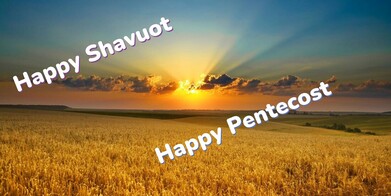
Originally a harvest festival, Shavuot focuses on the Torah and remembers the giving of the Law to Moses on Mt Sinai. Religious Jews will spend the night studying Torah, the synagogue will be decorated with flowers and there might even be a marriage canopy built around the Bimah as a symbol of the marriage between God and the People that took place when they accepted to live in a covenantal relationship with God. This happened 50 days after the Exodus from Egypt and there is a strong link between Pesach and Shavuot. Pesach was the moment of liberation when a group of slaves left Egypt to spend time wandering in the desert to finally become a people when they accepted God’s Law given to Moses on Sinai and committed to it as their way of life. The days in between Pesach (at least the second day of Pesach) until Shavuot are called the counting of Omer which parallels the wandering of the Israelites in the desert. Counting the Omer is the practice of marking the 49-day journey from Passover to Shavuot by saying a daily blessing and identifying each specific day according to its number. It has been described as a time of reflection to remember that process of moving from slavery to liberation and how that very liberation is only fulfilled after the Israelites became a people when they took on responsibility for their own Law at Sinai.
While the Jewish community has been counting the days of Omer Christians have been reflecting on the effect of the resurrection of Jesus on his disciples and his community. In church services and liturgies, the resurrection stories have been retold as have the stories of the early days of Christianity (not called that of course) when the apostles tried to share the good news of Jesus’ resurrection and how people responded. It gives an insight into an early community that has been brought together by a profound experience of being in a post-death relationship with Jesus, is trying to work out what this means for them as Jews and what it means to spread this word to others. Ten days ago was the feast of the Ascension which underlines that whatever the on-going relationship with Jesus was it was not in the flesh and the festival of Pentecost tells us that the relationship is through his spirit which keeps alive his presence and influence in the world. Pentecost is seen as the birthday of the Church when the apostles received this spirit which united them and established them as a community.
The parallels between the two festivals is obvious – the fulfilment of Judaism and Christianity’s foundation stories, celebrated fifty days ago and an acceptance of a way of life, expressed in the Torah and in the guidance of the Spirit, that forms both groups into a people and a community. There are also differences. The community of Judaism was associated with a particular people and a particular place. The Christian community was not to be confined to one nation or one language. It was to spread throughout the world and be available to different peoples and cultures. It was however to be united in its diversity and this by the common gift of the Spirit of Jesus, which is also the Spirit of God and simply known as the Holy Spirit.
Sadly, in the past the differences between the two faiths have led to Christianity being seen as the fulfilment of Judaism in such a way that it replaces it. This is called supersessionism and has been rejected by the main denominations of Christianity. A popular anti-Jewish trope was to see the God of the Old Testament as a judging and censorious God with Jews living in bondage to a Law while Christians lived in the freedom of the spirit with the assurance of eternal salvation which was to be found in Jesus and not in keeping to an out-dated law. This is to show an ignorance of the Hebrew Scriptures that Christians call the Old Testament. Some of the most beautiful passages about the love of God are to be found in the prophets and the whole story of the journey of the Israelites shows God as continuing saving and delivering them from themselves and their infidelities. It is also to misunderstand Torah which is the body of wisdom and law contained in the Jewish scriptures and other sacred literature and oral tradition. It can mean teaching, direction, guidance and law. For Jews the Torah is the voice of God and the Torah Scrolls are the symbol of God’s presence among them, the most sacred object of their faith and to live according to the Torah is to keep alive God’s presence among them. It is not a dead letter of the law and is to be reflected on and its meaning discerned through prayer and study. For this Jews would look for the guidance of God’s Spirit. For Jesus the Law was important. He did not reject it but claimed to fulfil it by interpreting it in a particular way, as did others of his time. Christians may claim to live by the Holy Spirit, but this does not excuse them from discerning the ways of the Spirit or what the Spirit is asking of them in their personal and community lives. Both communities are engaged in the same thing even in different ways.
Jonathan Sacks has said that to hear the voice of God you need a listening silence in the soul, an ability to listen with faith which he describes as “the ability to hear the music beneath the noise”. This is true for Jews and Christians alike in their embrace of the Torah for one and the embrace of the Spirit for the other. And in this we are in fact walking the same path.



 RSS Feed
RSS Feed
